外研版一年级起点三年级下册第6模块重点短语及知识点
【知识点】(词汇短语重点句型)英语三年级下册Module6 外研版三起
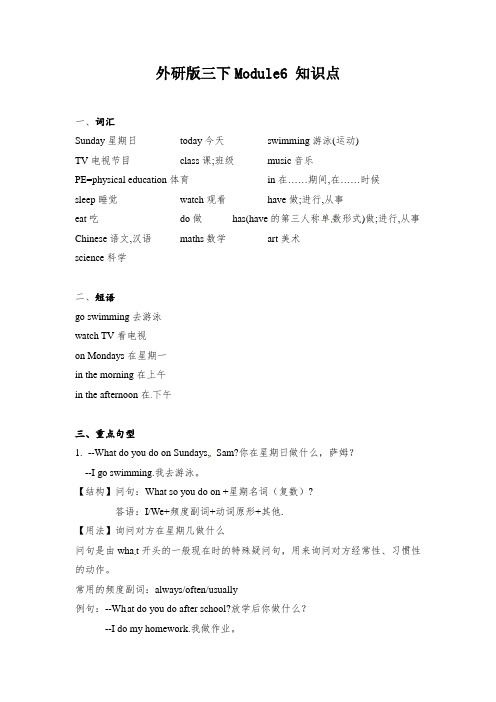
外研版三下Module6 知识点一、词汇Sunday星期日today今天swimming游泳(运动)TV电视节目class课;班级music音乐PE=physical education体育in在……期间,在……时候sleep睡觉watch观看have做;进行,从事eat吃do做has(have的第三人称单数形式)做;进行,从事Chinese语文,汉语maths数学art美术science科学二、短语go swimming去游泳watch TV看电视on Mondays在星期一in the morning在上午in the afternoon在下午三、重点句型1.--What do you do on Sundays,Sam?你在星期日做什么,萨姆?--I go swimming.我去游泳。
【结构】问句:What so you do on +星期名词(复数)?答语:I/We+频度副词+动词原形+其他.【用法】询问对方在星期几做什么问句是由wha t开头的一般现在时的特殊疑问句,用来询问对方经常性、习惯性的动作。
常用的频度副词:always/often/usually例句:--Wh at do you do after school?放学后你做什么?--I do my homework.我做作业。
【拓展】如果就其他人称提问,要注意句型中助动词do的变化(1)主语为复数人称时,句型为:Wha t do+主语+do+on+星期名词(复数)?如:--What do they do on Fridays?他们在星期五做什么?(2)主语为第三人称单数时,句型为:What do+主语+does+on+星期名词(复数)?如:--What does he do on Mondays?她在星期一做什么?2.I go swimming.我去游泳。
当表达去做某事时,可以用go+V-ing形式【补充】go hiking去远足go sh opping去购物go fishing去钓鱼go skating去滑冰go climbing去爬山3.--Wh at does Lingling have at school today, Daming?玲玲今天在学校上什么课,大明?--In the morning, she has Chinese, English…在上午,她上语文课、英语课……【结构】问句:What do/does+主语+have+on+星期名词(复数)?答语:主语+have/has+课程名称.【用法】询问某人在某一天的课程例句:--What do you have at school today?今天你在学校上什么课?--I have Maths and music.我上数学和音乐。
外研版三年级下册Module6
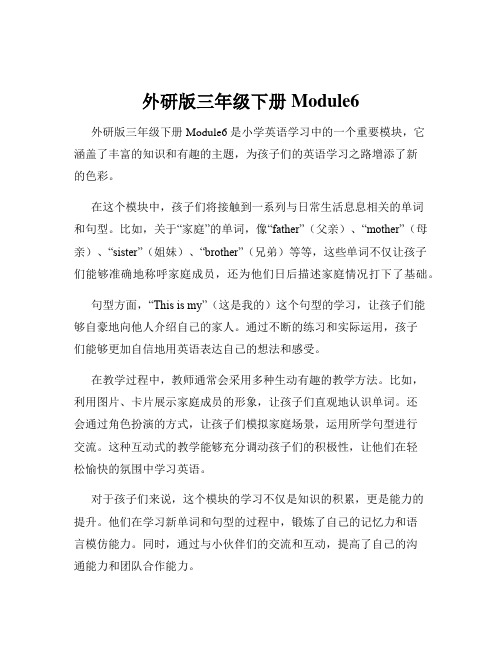
外研版三年级下册Module6外研版三年级下册 Module6 是小学英语学习中的一个重要模块,它涵盖了丰富的知识和有趣的主题,为孩子们的英语学习之路增添了新的色彩。
在这个模块中,孩子们将接触到一系列与日常生活息息相关的单词和句型。
比如,关于“家庭”的单词,像“father”(父亲)、“mother”(母亲)、“sister”(姐妹)、“brother”(兄弟)等等,这些单词不仅让孩子们能够准确地称呼家庭成员,还为他们日后描述家庭情况打下了基础。
句型方面,“This is my”(这是我的)这个句型的学习,让孩子们能够自豪地向他人介绍自己的家人。
通过不断的练习和实际运用,孩子们能够更加自信地用英语表达自己的想法和感受。
在教学过程中,教师通常会采用多种生动有趣的教学方法。
比如,利用图片、卡片展示家庭成员的形象,让孩子们直观地认识单词。
还会通过角色扮演的方式,让孩子们模拟家庭场景,运用所学句型进行交流。
这种互动式的教学能够充分调动孩子们的积极性,让他们在轻松愉快的氛围中学习英语。
对于孩子们来说,这个模块的学习不仅是知识的积累,更是能力的提升。
他们在学习新单词和句型的过程中,锻炼了自己的记忆力和语言模仿能力。
同时,通过与小伙伴们的交流和互动,提高了自己的沟通能力和团队合作能力。
此外,Module6 中的英语学习还能够培养孩子们的文化意识。
让他们了解到不同国家和地区的家庭文化差异,拓宽了他们的视野,增进了对世界的认识。
家长们在孩子学习这个模块的过程中,也可以发挥积极的作用。
比如,在家中与孩子一起复习单词和句型,用英语交流家庭中的事情。
还可以通过观看英语动画片、阅读英语绘本等方式,为孩子创造更多的英语学习环境。
总之,外研版三年级下册 Module6 为孩子们打开了一扇了解英语世界的窗户,让他们在充满乐趣的学习中不断进步。
相信通过这个模块的学习,孩子们会更加热爱英语,为今后的学习打下坚实的基础。
在实际教学中,我们发现孩子们对于家庭成员的称呼很感兴趣,他们会积极地向老师和同学介绍自己的家人。
【最新】外研社一起点三年级下学期英语知识点(最新整理)

after Tuesday Wednesday
No, I won’t.
1、 学习并运用 will do 句式结构描述将要
谈论将来的 Thursday Monday
韵文韵脚:
M5
Will you take your ball t短语:on Saturday / have a
They haven’t got oranges.
情;数字 短语:go to a fruit farm/ pick But we will pick peaches.
fruit/ at this fruit farm/ on these Peaches are my favourite fruit.
地点有什么
have a look
The monster has got one leg.
There is a pen on the desk..
1. 学习并运用 there be+number+n.句型, 描述某处/某物有多少某物。 2. 学习并运用 here are r+n.句型对物体进 行描述。
Grundy:/i/
Monday
Tuesday
He will sleep on Sunday.
2、 知道一周 7 天的英语表达方式
picnic/ take your kite to the
Wednesday
Thursday
Friday
What day is after Tuesday?
picnic/
Will Sam go, too?
谈论将来可 短语:lots of / visit my grandpa /
Yes, he will.
外研版三年级英语下册 Module 6知识点
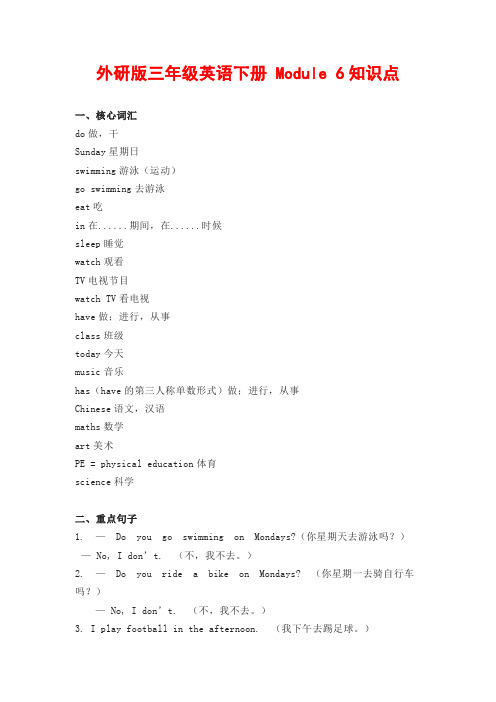
外研版三年级英语下册 Module 6知识点一、核心词汇do做,干Sunday星期日swimming游泳(运动)go swimming去游泳eat吃in在......期间,在......时候sleep睡觉watch观看TV电视节目watch TV看电视have做;进行,从事class班级today今天music音乐has(have的第三人称单数形式)做;进行,从事Chinese语文,汉语maths数学art美术PE = physical education体育science科学二、重点句子1. —Do you go swimming on Mondays?(你星期天去游泳吗?)— No, I don’t. (不,我不去。
)2. —Do you ride a bike on Mondays? (你星期一去骑自行车吗?)— No, I don’t. (不,我不去。
)3. I play football in the afternoon. (我下午去踢足球。
)4. —What do you do in the morning?(上去你做什么去?)— I sleep in the morning. (我上午睡觉。
)5. —What do you do on Sundays?(星期天你做什么?)— I watch TV on Sundays. (星期天我看电视。
)6. —What does Lingling have at school? (玲玲在学校上什么课?)— In the morning, she has Chinese, English and maths. (上午她上语文、英语和数学课。
)三、句型结构①询问对方在星期几做什么— What do you do on + 星期?— I + usually / often / sometimes + 动词原形+ 其他.eg: —What do you do on Tuesdays? (星期二你做什么?)— I usually go to school. (我通常去上学。
外研版一年级起点三年级下册重点单词及知识点
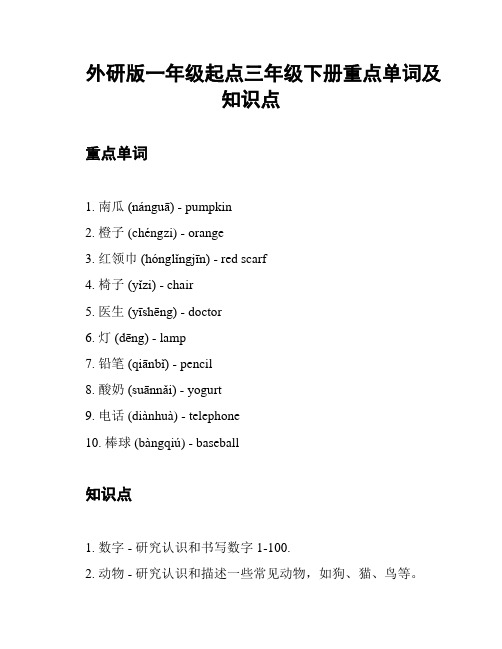
外研版一年级起点三年级下册重点单词及知识点重点单词1. 南瓜(nánguā) - pumpkin2. 橙子 (chéngzi) - orange3. 红领巾(hónglǐngjīn) - red scarf4. 椅子(yǐzi) - chair5. 医生(yīshēng) - doctor6. 灯(dēng) - lamp7. 铅笔(qiānbǐ) - pencil8. 酸奶(suānnǎi) - yogurt9. 电话 (diànhuà) - telephone10. 棒球 (bàngqiú) - baseball知识点1. 数字 - 研究认识和书写数字 1-100.2. 动物 - 研究认识和描述一些常见动物,如狗、猫、鸟等。
3. 食物 - 研究认识和描述一些常见食物,如苹果、香蕉、面包等。
4. 人物 - 研究认识和描述一些常见人物,如爸爸、妈妈、老师等。
5. 颜色 - 研究认识和描述一些基本颜色,如红色、蓝色、绿色等。
6. 季节 - 研究认识和描述四个季节,如春天、夏天、秋天、冬天等。
7. 家具 - 研究认识和描述一些常见的家具,如桌子、椅子、床等。
8. 职业 - 研究认识和描述一些常见职业,如医生、教师、警察等。
9. 学校 - 研究认识和描述一些与学校相关的事物,如教室、图书馆、操场等。
10. 交通工具- 研究认识和描述一些常见的交通工具,如汽车、自行车、火车等。
以上是外研版一年级起点三年级下册的重点单词和知识点。
希望对你的学习有所帮助!。
外研社新标准一年级起点三年级下学期英语知识点

外研社新标准一年级起点三年级下学期英语知识点New Standard English Book 6 Teaching Content Analysis (Draft)XXX Linguistic PointsM1 Describing a person's personality Traits nice。
always。
but。
shy。
quiet。
loud。
helpful。
plus 20 more Phrase: a bit。
make e-cards This is Xiaoyong。
He is clever。
but a bit quiet。
She is nice。
and I am going to help her。
Using subject + be verb+ adjective structure to describe a person's character。
Using "be going to do" XXX: good。
bad。
sad (/d/)。
happy。
naughty (/i/)。
shy。
nice。
cry (/ai/) Using adjectives to describe a city。
M2 Describing the characteristics of a building。
landmark or place Old。
from。
river。
clock。
high。
new。
wide。
London。
round。
of course Phrase: from London This river is wide and long。
This is Big Ben。
which is tall。
Maybe we will go to the zoo。
Using adjectives to XXX。
M3 Talking about future events Words: tiger。
外研版三年级英语下册课件Module 6
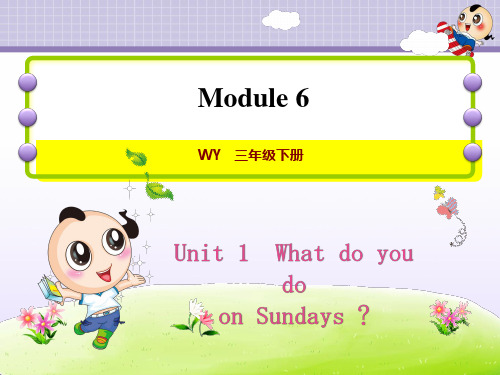
Sam: I sleep in the morning. What do you do in the morning?
Man: I ride my bike in the morning. Sam: What do you do in the afternoon? Man: I watch TV in the afternoon.
I ride my bike on Sundays.
I watch TV in the afternoon.
开火车。
周末你的同伴通常做什么呢?六人一组,小组成员轮流 用What do you do …?/ I …句型做问答练习。快来和你的同 伴一起玩一玩,问一问吧!
What do you do on Sundays?
Do you go swimming on Mondays?
No,I don’t.
Do you ride a bike on Mondays ?
What do you do on Mondays?
I eat meat. Ha ha...
No, I don’t.
Oh no!
讲解来自《点拨》
知识点 1
注意句型中的“星期名词”通常使用复数形式。
讲解来自《点拨》
知识点 3
/ɪn/ prep. (介词) 在……期间, 在……时候
例句: I play basketball in the morning. 我早上打篮球。 一词多义: in 在……里面 短语: in the afternoon 在下午 联想词: on 在……的时候
例句:I watch TV in the afternoon.
我下午看电视。 短语: watch TV 看电视
外研版一年级起点三年级下册重点语法及知识点
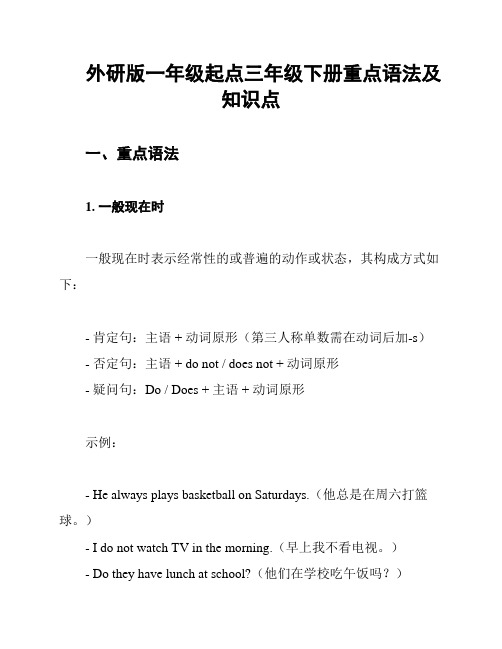
外研版一年级起点三年级下册重点语法及知识点一、重点语法1. 一般现在时一般现在时表示经常性的或普遍的动作或状态,其构成方式如下:- 肯定句:主语 + 动词原形(第三人称单数需在动词后加-s)- 否定句:主语 + do not / does not + 动词原形- 疑问句:Do / Does + 主语 + 动词原形示例:- He always plays basketball on Saturdays.(他总是在周六打篮球。
)- I do not watch TV in the morning.(早上我不看电视。
)- Do they have lunch at school?(他们在学校吃午饭吗?)2. 一般过去时一般过去时表示过去发生的动作或存在的状态,其构成方式如下:- 肯定句:主语 + 动词过去式- 否定句:主语 + did not + 动词原形- 疑问句:Did + 主语 + 动词原形示例:- We visited the zoo last week.(我们上周参观了动物园。
)- She didn't go to the party yesterday.(她昨天没有去参加聚会。
)- Did you have breakfast this morning?(今天早上你吃过早饭了吗?)3. 现在进行时现在进行时表示现在正在进行的动作,其构成方式如下:- 肯定句:主语 + am / is / are + 动词-ing- 否定句:主语 + am / is / are + not + 动词-ing- 疑问句:Am / Is / Are + 主语 + 动词-ing示例:- They are playing in the park now.(他们正在公园里玩。
)- I am not studying right now.(我现在不在研究。
)- Is she watching TV at home?(她在家看电视吗?)二、重点知识点1. 数字在外研版一年级起点三年级下册中,会研究如何读写数字和进行简单的数学运算。
外研新标准(一年起点)三年级下重点短语及句型
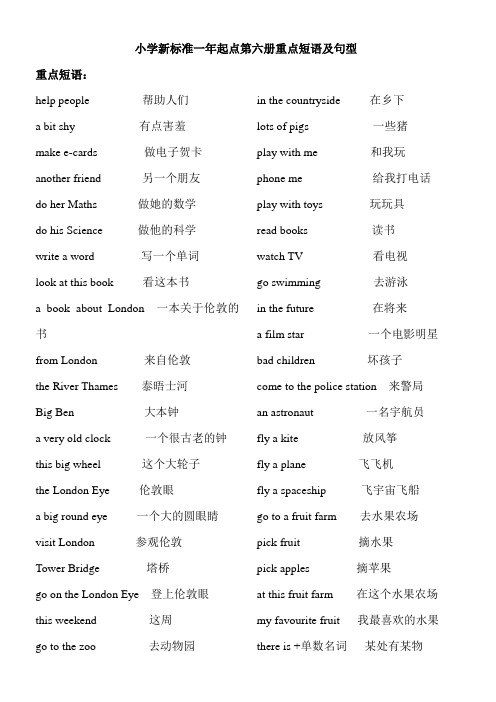
小学新标准一年起点第六册重点短语及句型重点短语:help people 帮助人们a bit shy 有点害羞make e-cards 做电子贺卡another friend 另一个朋友do her Maths 做她的数学do his Science 做他的科学write a word 写一个单词look at this book 看这本书a book about London 一本关于伦敦的书from London 来自伦敦the River Thames 泰晤士河Big Ben 大本钟a very old clock 一个很古老的钟this big wheel 这个大轮子the London Eye 伦敦眼a big round eye 一个大的圆眼睛visit London 参观伦敦Tower Bridge 塔桥go on the London Eye 登上伦敦眼this weekend 这周go to the zoo 去动物园in the countryside 在乡下lots of pigs 一些猪play with me 和我玩phone me 给我打电话play with toys 玩玩具read books 读书watch TV 看电视go swimming 去游泳in the future 在将来a film star 一个电影明星bad children 坏孩子come to the police station 来警局an astronaut 一名宇航员fly a kite 放风筝fly a plane 飞飞机fly a spaceship 飞宇宙飞船go to a fruit farm 去水果农场pick fruit 摘水果pick apples 摘苹果at this fruit farm 在这个水果农场my favourite fruit 我最喜欢的水果there is +单数名词某处有某物there are+复数名词某处有某物重点句型:She always helps people. 她总帮助别人。
外研版(三起)英语三下 第六模块重点句型和短语2
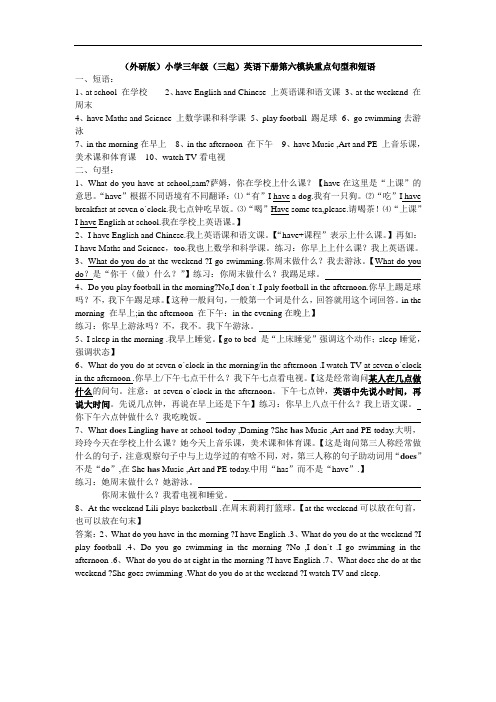
(外研版)小学三年级(三起)英语下册第六模块重点句型和短语一、短语:1、at school 在学校2、have English and Chinese 上英语课和语文课3、at the weekend 在周末4、have Maths and Science 上数学课和科学课5、play football 踢足球6、go swimming去游泳7、in the morning在早上8、in the afternoon 在下午9、have Music ,Art and PE 上音乐课,美术课和体育课10、watch TV看电视二、句型:1、What do you have at school,sam?萨姆,你在学校上什么课?【have在这里是“上课”的意思。
“have”根据不同语境有不同翻译:⑴“有”I have a dog.我有一只狗。
⑵“吃”I have breakfast at seven o`clock.我七点钟吃早饭。
⑶“喝”Have some tea,please.请喝茶!⑷“上课”I have English at school.我在学校上英语课。
】2、I have English and Chinese.我上英语课和语文课。
【“have+课程”表示上什么课。
】再如:I have Maths and Science,too.我也上数学和科学课。
练习:你早上上什么课?我上英语课。
3、What do you do at the weekend ?I go swimming.你周末做什么?我去游泳。
【What do you do?是“你干(做)什么?”】练习:你周末做什么?我踢足球。
4、Do you play football in the morning?No,I don`t .I paly football in the afternoon.你早上踢足球吗?不,我下午踢足球。
【这种一般问句,一般第一个词是什么,回答就用这个词回答。
外研社小学英语一年级起点三年级下册 Module 6 单词学习 课件
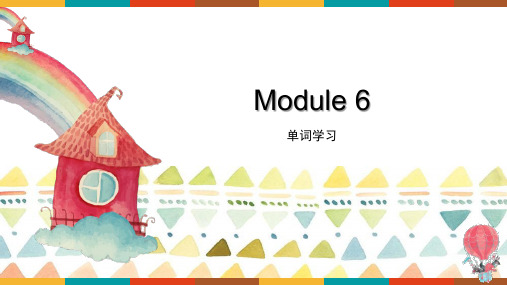
one mouth two mouths
数量超过1, mouth+s
one face
two faces
数量超过1, face+s
one foot
two feet
特殊:数量超过1, foot o→e
one body
two bodies
特殊:数量超过1, body y→ies
Module 6
单词学习
head
eye
ear face leg foot
nose mouth arm hand
body
one head
two heads
数量超过1, head+s
one eye
two eyes
数量超过1, eye+s
one ear two ears
数量超过1, ear+s
one nose two noses
Here are his eyes 这是他的眼睛
There is ...这有 There are ...这有
There is one nose 这有一只鼻子
There are two eyes 这有两只眼睛
on
in front of behind
next to
between
under
in
This is my room 这是我的房间
head
eye ear nose foot body
mouth face arm leg hot body
mouth face arm leg hand
clap
stamp
Here is ...这是 Here are ...这是
外研社小学新标准(一年起点)第六册三年级下学期重点短语及句型总结

山姆也将要去么?
3.Yes , he will.
是的,他将会(去)。
4.Will you play with me this weekend? 这周末你将和我玩么?
5.Will you phone me? 你将要给我打电话么?
1.Maybe we’ll go to the zoo. 2.Will Sam go,too? 3.Yes , he will. 4.Will you play with me this weekend? 5.Will you phone me?
M7 句子
1. They weren’t old then.
在那是他们不古老。
2.They were very young.
他们非常年轻。
3. My hair wasn’t long then.
在那时我的头发不长。
4. It was very short.
它是非常短的。
外研社 小学新标准(一年起点)三年级下 第六册
重点短语及句型
描述性格特点
M1 词组
M1
help people 帮助人们
a bit
有一点
make e-cards
制作电子贺卡
a piece of paper
一张纸
write on
在……上写……
M1
help people a bit make e-cards a piece of paper write on
他努力工作。
6. She’s very good at Maths.
她非常擅长数学。
7. She’s quite good at English.
她十分擅长英语。
8. She tries hard at Science.
外研版一年级起点三年级下册第6模块重点短语及知识点

M6重点短语U11.foot—复数—f ee t(脚) tooth—复数—t ee th(牙齿) goose—复数—g ee se (鹅)2. child—复数—child ren(孩子们)3. draw a picture 画一幅画4. on the computer 在电脑上5. What shall we draw? 我们将要画什么?Shall:在将来时态中,碰到第一人称 will变 shall,语气更加委婉。
动词,观看,观赏6. watch名词,手表,复数:watch es7. Here is + 单数名词,(例:Here is his head.)复数名词,(例:Here are his arms)Here are+由and连接的两个或两个以上的单数名词(例:Here are his leg andhis foot.)8. have a look 看一看9.his head 他的头hands 他的手leg 他的腿feet 他的脚arms 他的胳膊body 他的身体10. There be 句型:表示某处有某物There is a book and two pens. 有一本书和两只钢笔 (近视眼:就近原则) are two pens and a book. 有两只钢笔和一本书 (区分)Here (is / are ) a book and two pens.而Here 没有就近原则,两个以上的物品无论谁在前都用are.U211. on your face 在你的脸上12. our poster 我们的海报13. a small monster 一只小怪物14. two big monsters 两只大怪物15. three green parrots 三只绿鹦鹉16. There be句型的否定形式:(有两个)没有鹦鹉了)There is not any parrot.(There be句型的否定,在Be动词后+no,或者 not any)17. 语法点:可数名词单数变复数⑴.一般在词尾加-s 例如: book — book s书2.以s,sh,ch,x结尾的词在词尾加-es,.例如:watch — watch es 手表3.以o结尾的词,有生命的加-es,例如:tomato — tomato es西红柿无生命的加-s,例如:zoo — zoo s动物园4.以f 或fe 结尾的词,先把f 改为v,再加–es,例如: knife — kni ves小刀5.以辅音字母加y 结尾的,先把y 改为i,再加-es,例如:fly—fl ies苍蝇6.变元音字母1. a 变 e , 例如:man—m e n 男人,woman—wom e n 女人2.oo 变 ee, 例如:foot—f ee t 脚, tooth—t ee th 牙齿,goose—g ee se 鹅7. child—child ren孩子们8. 国家类中日不变,英法变,其他都加-s例如:Chinese—Chinese 中国人 Englishman—Englishm e n 英国人German—German s德国人9. 单复数同形词例如:people—people 人们 deer—deer 小鹿 fish—fish 鱼 sheep—sheep 羊。
外研社(一年级起)英语三年级下册知识点汇总
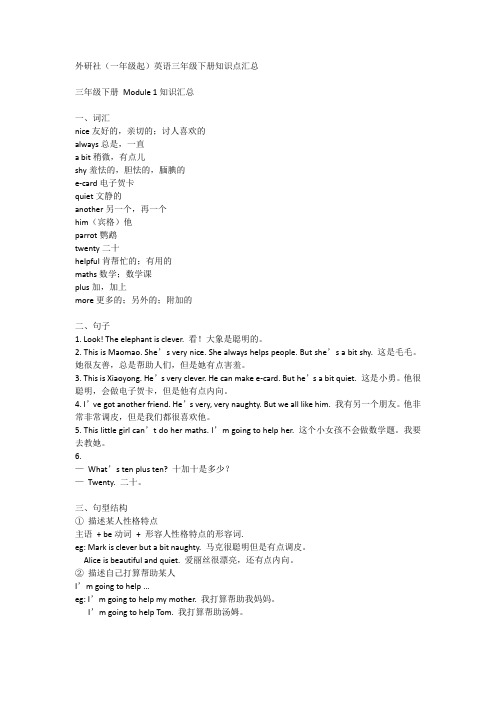
外研社(一年级起)英语三年级下册知识点汇总三年级下册Module 1知识汇总一、词汇nice友好的,亲切的;讨人喜欢的always总是,一直a bit稍微,有点儿shy羞怯的,胆怯的,腼腆的e-card电子贺卡quiet文静的another另一个,再一个him(宾格)他parrot鹦鹉twenty二十helpful肯帮忙的;有用的maths数学;数学课plus加,加上more更多的;另外的;附加的二、句子1. Look! The elephant is clever. 看!大象是聪明的。
2. This is Maomao. She’s very nice. She always helps people. But she’s a bit shy. 这是毛毛。
她很友善,总是帮助人们,但是她有点害羞。
3. This is Xiaoyong. He’s very clever. He can make e-card. But he’s a bit quiet. 这是小勇。
他很聪明,会做电子贺卡,但是他有点内向。
4. I’ve got another friend. He’s very, very naughty. But we all like him. 我有另一个朋友。
他非常非常调皮,但是我们都很喜欢他。
5. This little girl can’t do her maths. I’m going to help her. 这个小女孩不会做数学题。
我要去教她。
6.—What’s ten plus ten? 十加十是多少?—Twenty. 二十。
三、句型结构①描述某人性格特点主语+ be动词+ 形容人性格特点的形容词.eg: Mark is clever but a bit naughty. 马克很聪明但是有点调皮。
Alice is beautiful and quiet. 爱丽丝很漂亮,还有点内向。
外研版 Module 6 重点短语总结
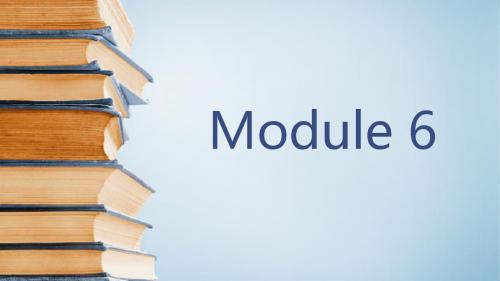
2. the way to 去……的路
on one’s way to 在某人去……的路上
(注意后面接home, here, there时,不用to) the best way to do 做某事最好的方法
3. go across 穿过
7. opposite = across from 在……的对面 8. Why not = Why don’t you 为什么不……? 注意:后面需要接动词原形 9. get to = arrive in/ at = reach 到达 arrive in + 大地方 arrive in Beijing arrive at + 小地方 arrive at airport reach + 地点 思考: 如果后面加home, here, there时,应该加什么介词? 答案:不用加介词:arrive home/here/there
10. take the underground to 乘坐地铁去…… take + 定冠词 + 交通工具 = by + 交通工具 乘坐 注意:in/on + 限定词 + 交通工具,也可以表示乘坐 1)on:用在开放型或半开放型工具前 2)in: 用在封闭型工具前 in a car on my bike 11. Have a nice day! 祝你玩得愉快!
go along 沿着走
注意:across, through, over, past之间的区别 1)across:表示“穿过,越过”,一般指从平面穿过,例如游渡,乘船过海或过河
2)through:表示“穿过,越过”,指从三维空间里,或人群中间穿过
3)over: 多指在空间范围上“越过” 4)past:指“经过”
- 1、下载文档前请自行甄别文档内容的完整性,平台不提供额外的编辑、内容补充、找答案等附加服务。
- 2、"仅部分预览"的文档,不可在线预览部分如存在完整性等问题,可反馈申请退款(可完整预览的文档不适用该条件!)。
- 3、如文档侵犯您的权益,请联系客服反馈,我们会尽快为您处理(人工客服工作时间:9:00-18:30)。
M6重点短语
U1
1.foot—复数—feet(脚) tooth—复数—teeth(牙齿) goose—复数—geese (鹅)
2. child—复数—children(孩子们)
3. draw a picture 画一幅画
4. on the computer 在电脑上
5. What shall we draw? 我们将要画什么?
Shall:在将来时态中,碰到第一人称 will变 shall,语气更加委婉。
动词,观看,观赏
6. watch
名词,手表,复数:watches
7. Here is + 单数名词,(例:Here is his head.)
复数名词,(例:Here are his arms)
Here are+
由and连接的两个或两个以上的单数名词(例:Here are his leg and his foot.)
8. have a look 看一看
9.his head 他的头
hands 他的手
leg 他的腿
feet 他的脚
arms 他的胳膊
body 他的身体
10. There be 句型:表示某处有某物
There is a book and two pens. 有一本书和两只钢笔
(近视眼:就近原则有两只钢笔和
一本书
(区分)Here (is / are ) a book and two pens.
而Here 没有就近原则,两个以上的物品无论谁在前都用are.
U2
11. on your face 在你的脸上
12. our poster 我们的海报
13. a small monster 一只小怪物
14. two big monsters 两只大怪物
15. three green parrots 三只绿鹦鹉
16. There be句型的否定形式:(有两个)
没有鹦鹉了)
not any
There is not any parrot.
(There be句型的否定,在Be动词后+no,或者 not any)
17. 语法点:可数名词单数变复数
⑴.一般在词尾加-s 例如: book — books 书
2.以s,sh,ch,x结尾的词在词尾加-es,.例如:watch — watches 手表
3.以o结尾的词,有生命的加-es,例如:tomato — tomatoes 西红柿
无生命的加-s,例如:zoo — zoos 动物园
4.以f 或fe 结尾的词,先把f 改为v,再加–es,例如: knife — knives 小刀
5.以辅音字母加y 结尾的,先把y 改为i,再加-es,例如:fly—flies苍蝇
6.变元音字母
1. a 变 e , 例如:man—men 男人,woman—women 女人
2.oo 变 ee, 例如:foot—feet 脚, tooth—teeth 牙齿,goose—geese 鹅
7. child—children 孩子们
8. 国家类
中日不变,英法变,其他都加-s
例如:Chinese—Chinese 中国人 Englishman—Englishmen 英国人
German—Germans 德国人
9. 单复数同形词
例如:people—people 人们 deer—deer 小鹿 fish—fish 鱼sheep—sheep 羊
THANKS !!!
致力为企业和个人提供合同协议,策划案计划书,学习课件等
等
打造全网一站式需求
欢迎您的下载,资料仅供参考。
